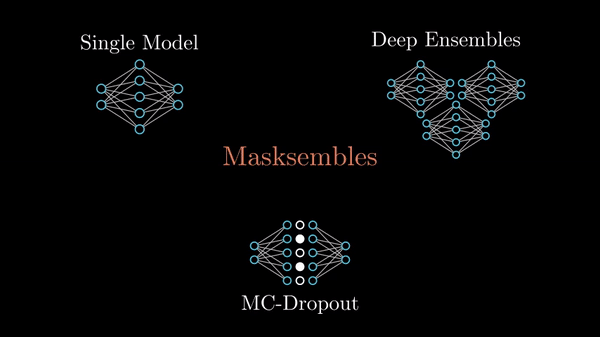Official implementation of Masksembles approach from the paper "Masksembles for Uncertainty Estimation" by Nikita Durasov, Timur Bagautdinov, Pierre Baque, Pascal Fua. In 2021 IEEE/CVF Conference on Computer Vision and Pattern Recognition (CVPR)
To install this package, use:
pip install git+http://github.com/nikitadurasov/masksemblesIn addition, Masksembles requires installing at least one of the backends: torch or tensorflow2 / keras. Please follow official installation instructions for torch or tensorflow accordingly.
This package provides implementations for Masksembles{1|2|3}D layers in masksembles.{torch|keras}
where {1|2|3} refers to dimensionality of input tensors (1-, 2- and 3-dimensional
accordingly).
Masksembles1D: works with 1-dim inputs,[B, C]shaped tensorsMasksembles2D: works with 2-dim inputs,[B, H, W, C](keras) or[B, C, H, W](torch) shaped tensorsMasksembles3D: TBD
In a Nutshell, Masksembles applies binary masks to inputs via multiplying them both channel-wise. For more efficient
implementation we've followed approach similar to this one. Therefore, after inference
outputs[:B // N] - stores results for the first submodel, outputs[B // N : 2 * B // N] - for the second and etc.
import torch
from masksembles.torch import Masksembles1D
layer = Masksembles1D(10, 4, 2.)
layer(torch.ones([4, 10]))tensor([[0., 1., 0., 0., 1., 0., 1., 1., 1., 1.],
[0., 0., 1., 1., 1., 1., 0., 0., 1., 1.],
[1., 0., 1., 1., 0., 0., 1., 0., 1., 1.],
[1., 0., 0., 1., 1., 1., 0., 1., 1., 0.]], dtype=torch.float64)
import tensorflow as tf
from masksembles.keras import Masksembles1D
layer = Masksembles1D(4, 2.)
layer(tf.ones([4, 10]))<tf.Tensor: shape=(4, 10), dtype=float32, numpy=
array([[0., 1., 1., 0., 1., 1., 1., 0., 1., 0.],
[0., 1., 0., 1., 1., 0., 1., 1., 0., 1.],
[1., 1., 1., 1., 0., 0., 1., 0., 0., 1.],
[1., 0., 0., 1., 0., 1., 1., 0., 1., 1.]], dtype=float32)>import tensorflow as tf
from masksembles.keras import Masksembles1D, Masksembles2D
model = keras.Sequential(
[
keras.Input(shape=input_shape),
layers.Conv2D(32, kernel_size=(3, 3), activation="elu"),
Masksembles2D(4, 2.0),
layers.MaxPooling2D(pool_size=(2, 2)),
layers.Conv2D(64, kernel_size=(3, 3), activation="elu"),
Masksembles2D(4, 2.0),
layers.MaxPooling2D(pool_size=(2, 2)),
layers.Flatten(),
Masksembles1D(4, 2.),
layers.Dense(num_classes, activation="softmax"),
]
)